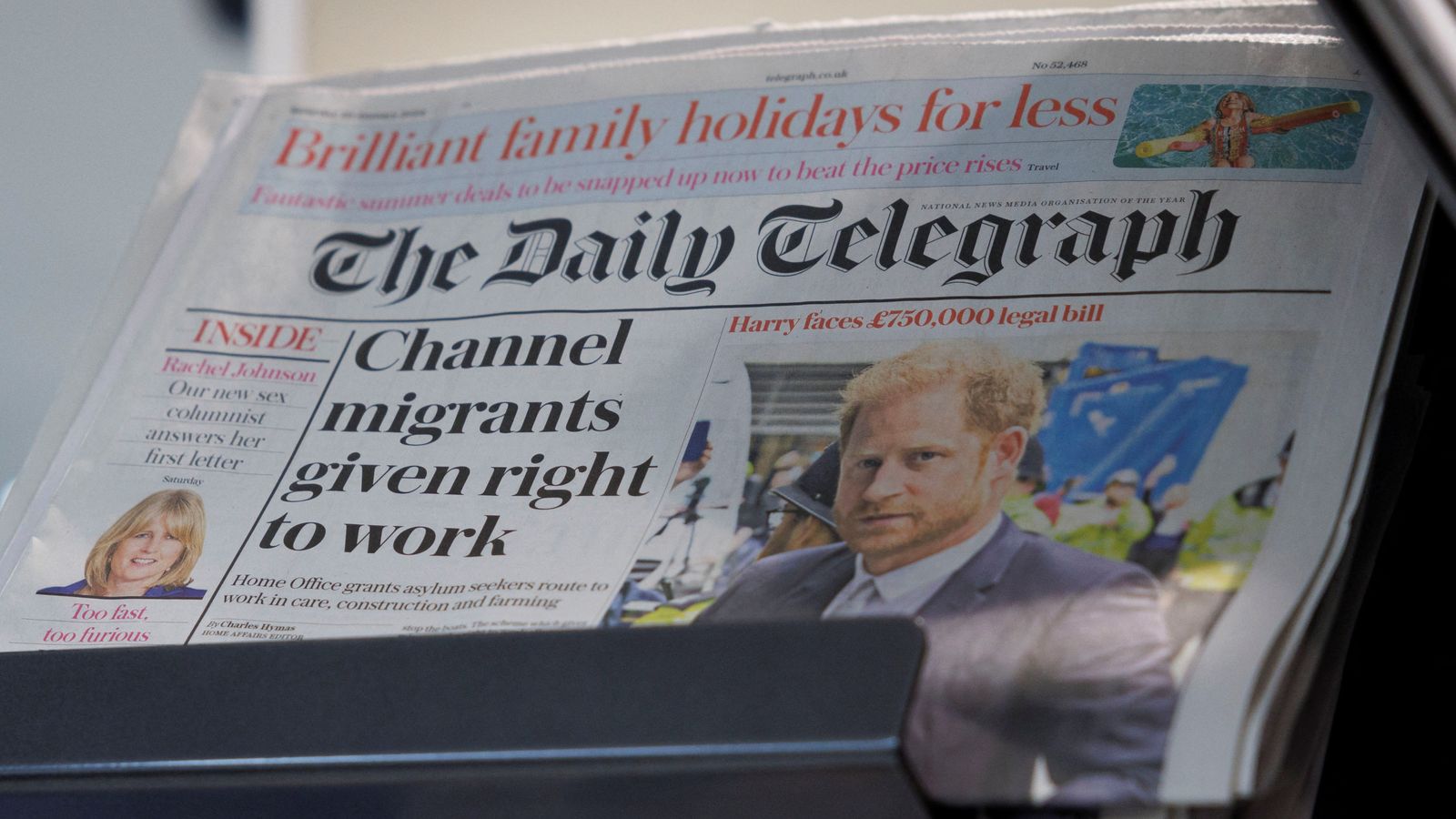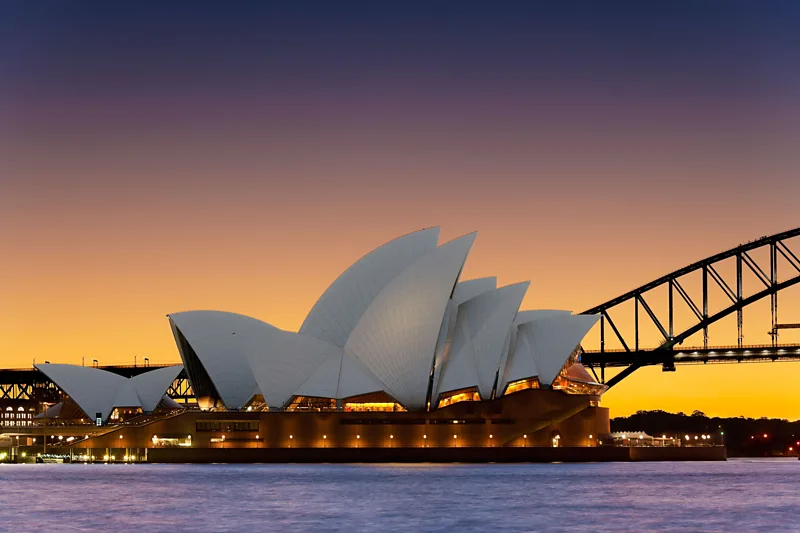Foreign governments face ban on owning British newspapers - effectively blocking Abu Dhabi-led Telegraph takeover
While the Telegraph sale is on course to be blocked in its current form, it could potentially still get the go ahead if a different ownership structure is agreed.

The government plans to ban foreign governments from owning British newspapers and magazines - effectively blocking an Abu Dhabi-led takeover of the Daily and Sunday Telegraph.
The commitment was set out in the House of Lords this afternoon in an amendment to the third reading of the Digital Markets Act, which is currently making its way through Parliament.
Culture minister Lord Parkinson said: "We will amend the media merger regime explicitly to rule out newspaper and periodical news magazine mergers involving ownership, influence or control by foreign states."
He added: "Under the new measures the secretary of state would be obliged to refer media merger cases to the Competition and Markets Authority (CMA) through a new foreign state intervention notice."
The secretary of state, the peer said, would be obliged to block deals found to contravene the CMA's tests.
The move was welcomed by The Spectator's chairman, the veteran journalist Andrew Neil, in a Sky News interview.
He told Politics Hub with Adam Parsons the government was effectively forced into the move due to the swell of political opposition to the proposed takeover of the Telegraph titles and The Spectator magazine by RedBird-IMI.
Mr Neil argued the deal was technically dead, and added: "Our understanding is that there would be no cut-off point. The cut-off point is zero per cent. Redbird will not be able to dilute this.
"Our understanding is that a foreign government can have no percentage in this kind of deal and the other good thing that we learned just a couple of hours ago is that it explicitly includes The Spectator... We're covered by this too."
He confirmed he would have left his position had the RedBird takeover gone through.
'We had done a lot to thwart him from the Spectator and the Telegraph'
The US-Abu Dhabi joint venture is 75% owned by Sheikh Mansour, vice president of the United Arab Emirates (UAE).
The future of the Telegraph titles has been the subject of fierce debate in Conservative circles since RedBird circumvented a formal auction by repaying money owed to Lloyds Bank by former owners the Barclay family, who had put the newspapers up as security.
Former Tory leaders Lord Hague and Iain Duncan Smith opposed the takeover arguing that it was inappropriate for significant media assets to be effectively owned by a foreign state.
An Emirati royal who serves as the UAE's vice president and deputy prime minister, Sheikh Mansour bin Zayed Al Nahyan has an estimated net worth of £13.2bn – and he's already invested millions in British businesses.
His family, the House of Nahyan, is one of the United Arab Emirates's six ruling families and regarded as the richest in the world, with a fortune of £150bn.
The Al Nahyan dynasty has ruled Abu Dhabi since the 1700s and Sheikh Mansour's brother, Mohamed, is the current president.
The Sheikh heads up numerous UAE funds – including the one bidding to buy out the Telegraph titles – with stakes in businesses around the world.
In 2008, through his private equity company the Abu Dhabi United Group, Sheikh Mansour bought Manchester City football club for £200m. He has since invested a further £1.4bn, according to reports.
Many would argue the 53-year-old's spending has paid off, as not only has the men's first team gone from mid-table finishes to Champions League winners but the club is also now valued at an eye-watering £4bn.
Sheikh Mansour also owns a 32% stake in Sir Richard Branson's space exploration company Virgin Galactic and the Abu Dhabi Media Investment Corporation, which includes English-language newspaper The National and Sky News Arabia, a joint-venture with UK-based Sky, the owner of Sky News.
Scores of MPs have backed that opposition.
Culture Secretary Lucy Frazer referred the takeover to Ofcom and the CMA earlier this year on public interest grounds, effectively freezing the deal and leaving the Telegraph in limbo, the shares formally sitting with the Barclay family.
Lucy Frazer, Secretary of State for Culture, Media, and Sport, leaving 10 Downing Street, London, following a Cabinet meeting. Picture date: Tuesday January 30, 2024.
RedBird-IMI fronted by former CNN executive Jeff Zucker has consistently argued that Sheikh Mansour is investing in a personal capacity and pledged an independent editorial structure to prevent influence over content.
The government will not spell out the details of the legislation at this stage and it remains unclear what level of state investment might be permitted.
While the government's amendment would block the 75% stake proposed in the RedBird-IMI deal, smaller minority stakes that do not grant control may be permitted.
That may leave the way clear for RedBird-IMI to restructure its deal, with RedBird Capital taking a larger stake or inviting in other investors.
Lord Rothermere, owner of the Daily Mail, and Rupert Murdoch's News UK, owner of The Times, The Sun and Sunday Times, remain interested in a stake in the Telegraph having been outmanoeuvred in the original auction.
Another potential investor is Sir Paul Marshall, a co-owner of GB News.
If RedBird-IMI is blocked or cannot restructure the deal they insist they control the shares and retain the right to manage the onward sale of the titles. They are likely to face opposition from the Barclay family, who may try to retain control by raising fresh funding.
A spokesperson for RedBird-IMI said it was "extremely disappointed" by the effective blocking of the deal.
It said the proposed takeover was a "fully commercial undertaking" and that it would "now evaluate our next steps".
The proposed legislation could send a mixed message to overseas investors, particularly the UAE, which the government has enthusiastically courted as a partner in key industries.
The UAE has pumped money into numerous high-profile projects as part of a £10bn five-year investment programme, including wind farms and life sciences, and has been approached about a potential stake in the Sizewell C nuclear power station.
-sky news







